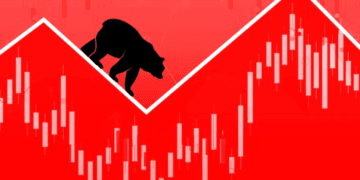Athira Sethu
Kochi, 7 April 2025
On Monday, Indian stock markets suffered a severe crash, with huge losses incurred by investors. The Sensex and Nifty both opened with a sharp plunge. The Sensex dipped more than 3,000 points, or 4%, and Nifty lost over 1,100 points, or 5%, by 9:16 AM. It was the largest single-day decline since June. The combined market capitalisation of all firms listed on the Bombay Stock Exchange (BSE) also dropped by Rs 19 lakh crore.
All the principal sectors in the market were hit. The Nifty Metal index fell by 8%, with the Nifty IT sector going down by more than 7%. Other markets such as Nifty Auto, Realty, and Oil & Gas fell by more than 5%. Small-scale companies were hit too, as small-cap shares fell by 10% while mid-cap fell by 7.3%.
So, why did this giant fall in the stock market take place?
- Global Stock Market Decline: The decline in India’s markets was after a global sell-off, when most stock markets across the globe fell. In the US, the Nasdaq index fell into a “bear market” when it declined more than 20% below its highest point. This was because of fears that tariffs, or import taxes, would slow the global economy.
- Tariffs and Slowing Down of Economy: The sudden drop in the markets was initiated by the announcement of tariffs by the U.S. President. The tariffs were creating apprehensions regarding the economy slowing down, and hence the investors started selling their stocks.
- Fear of Recession: Investors fear that the world economy could enter a recession, which is when the economy contracts and companies earn less money. This fear intensified as the U.S. imposed tariffs, which could increase the cost of products and damage the profits of companies.
- Plunge in Commodity Prices: The prices of crucial commodities such as oil, gold, and copper also fell. This is due to the perception that the global economy is losing strength, meaning that there will be fewer demands for these commodities.
- Investors Seeking Safety: Investors transferred a lot of money to safer grounds such as government bonds, and this led to even more selling in the stock market.
- Trade War Fears: Increasing concerns about a trade war between China and the U.S. China stated that it would raise tariffs on American goods following the increase of tariffs by the U.S. The intensifying fight could destroy world trade and weaken the economy further.
In essence, the crash has been due to a combination of concerns about escalated trade tensions, a global slowdown in economic activities, and global market selling off. Specialists claim that at a time of this uncertainty, taking a “wait and watch” approach would be more appropriate compared to jumping in with premature investments.





















